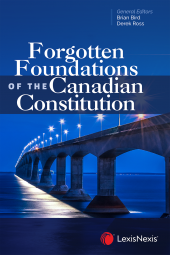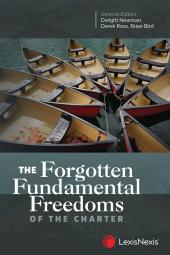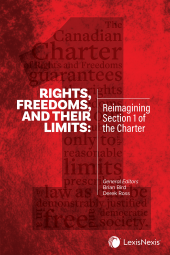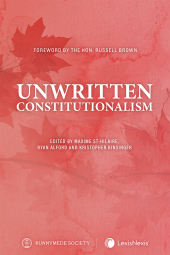Forgotten Foundations of the Canadian Constitution
One Year Subscription Only Terms
Subscribers receive the product(s) listed on the Order Form and any Updates made available during the annual subscription period. Shipping and handling fees are not included in the annual price.
Subscribers are advised of the number of Updates that were made to the particular publication the prior year. The number of Updates may vary due to developments in the law and other publishing issues, but subscribers may use this as a rough estimate of future shipments. Subscribers may call Customer Support at 800-833-9844 for additional information.
Subscribers may cancel this subscription by: calling Customer Support at 800-833-9844; emailing customer.support@lexisnexis.com; or returning the invoice marked 'CANCEL'.
If subscribers cancel within 30 days after the product is ordered or received and return the product at their expense, then they will receive a full credit of the price for the annual subscription.
If subscribers cancel between 31 and 60 days after the invoice date and return the product at their expense, then they will receive a 5/6th credit of the price for the annual subscription. No credit will be given for cancellations more than 60 days after the invoice date. To receive any credit, subscriber must return all product(s) shipped during the year at their expense within the applicable cancellation period listed above.
Product description
40 years after the Canadian Charter of Rights and Freedoms arrived and 155 years after Confederation, it might be tempting to think that we have come to grasp all of the facets of the Canadian Constitution. Forgotten Foundations of the Canadian Constitution reveals that the opposite is true. Many aspects of Canada’s constitutional order remain undertheorized and merit closer examination.
This collection seeks to excavate and explain a variety of foundational elements of the Canadian Constitution. Some of these elements reside in the text, some beneath it, and some only come into focus when the written and unwritten portions of the Constitution speak to each other.
The result is an enriching exploration of Canada’s constitutional architecture that will not only aid the work of judges, lawyers and scholars. It will benefit anyone who wishes to grow in knowledge of — and appreciation for — Canada’s supreme law.
The Collection of Papers
- Brian Bird & Derek Ross – Forgotten Foundations of the Canadian Constitution: An Introduction
- The Honourable Marshall Rothstein C.C., Q.C. – The Forgotten Roots of Canada’s Living Tree: Constitutional Interpretation and the Rule of Law
- Dwight Newman, Q.C. – God in the Constitution: The Supremacy of God Clause in the Preamble to the Canadian Charter of Rights and Freedoms
- John Sikkema – The First Division of Power: State Authority and the Preamble to the Charter
- Mark Mancini – The Rule of Law in Judicial Review Today
- Jamie Cameron – Resetting the Foundations: Renewing Freedom of Expression under Section 2(b) of the Charter
- Derek Ross – Pluralism and Freedom from Assimilation: A Foundation for a “Free and Democratic Society”
- Geoffrey T. Sigalet – The Truck and the Brakes: Understanding the Charter’s Limitations and Notwithstanding Clauses Symmetrically
- Brian Bird – Unchartered Rights and the Free and Democratic Society
- Matthew P. Harrington – “The Rights Retained By The People”: The Implications of the Ninth Amendment for the Interpretation of Section 26 of the Charter
- Blair Major – All the Voices of Religious Freedom
- André Schutten and Tabitha Ewert – Section 31 and the Charter’s Unexplored Constraints on State Power
- Ryan Alford – Applied Legal History and the Principled Way Forward to the Recognition of Implied Fundamental Rights
- Kristopher E.G. Kinsinger – Bringing About a Reformation? Religious Freedom and Canadian Constitutionalism, 1759-1774
Table of contents
SPECIAL ESSAY
PART I – FIRST PRINCIPLES: THE SUPREMACY OF GOD AND THE RULE OF LAW
PART II – LIMITING AND DELIMITING CHARTER RIGHTS AND FREEDOMS
PART III – THE CHARTER’S UNDEREXPLORED “GENERAL” CLAUSES
PART IV – THE FOUNDATIONAL ROLE OF CONSTITUTIONAL HISTORY
 Lexis Nexis
Lexis Nexis 


